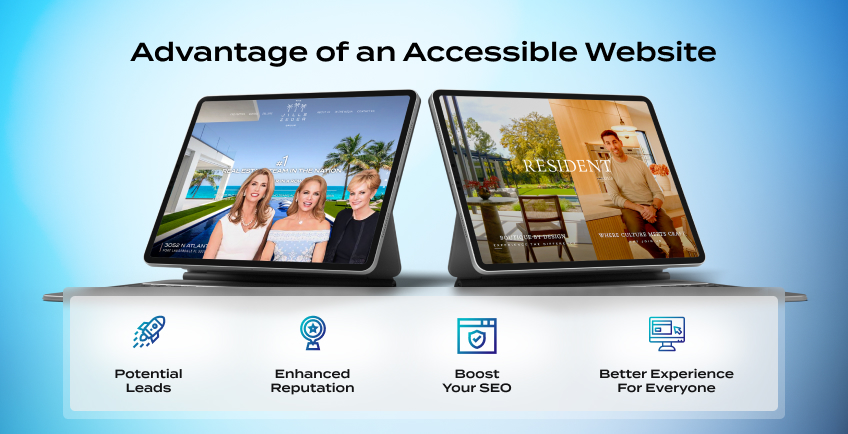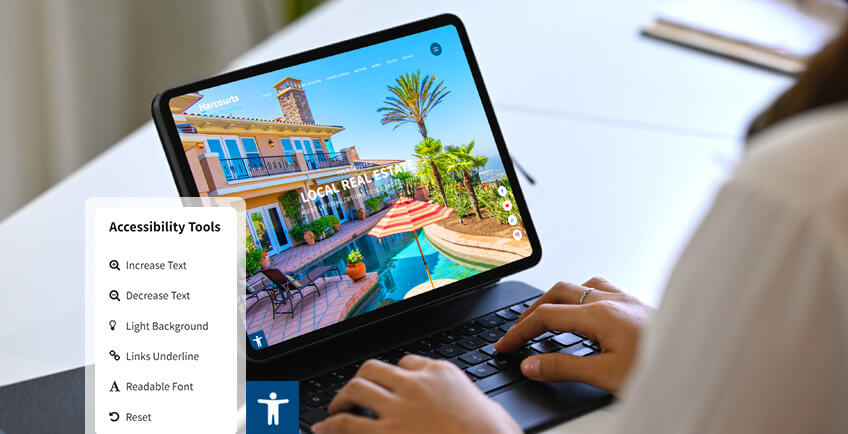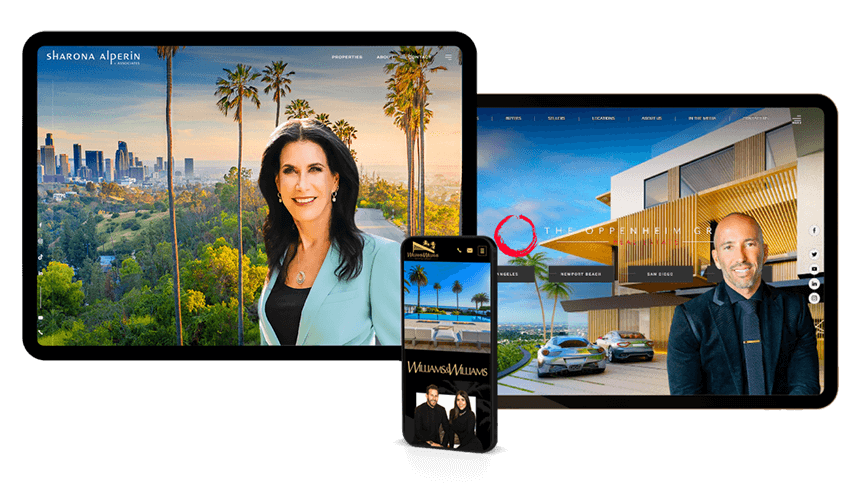Why Accessibility Is Vital In Website Design
As an agent, it’s your mission to help people find their dream homes. However, you may be inadvertently leaving behind a significant segment of potential clients: persons with disabilities (PWDs). And the culprit? Your website.
After all, how can you cater to this market if your website is designed only for those who don’t have disabilities? The good news, however, is that you can optimize your site for PWDs. Read on to know the whys and hows of accessible web design.
Make Every Visit Count—No Exceptions
An accessible site means more people can engage with your business.
Table of Contents
Accessibility Is The Law Of The Land
That’s right: websites are now required by law to be accessible to PWDs. This change is a result of the Department of Justice (DOJ) taking the position that consumer-facing websites are “places of public accommodation.”
It’s hardly surprising, though. Such is the ubiquity of the internet that many transactions and inquiries can be done online — something that was highlighted during the pandemic when many stores, offices, and government agencies closed down. Non-accessible websites would leave disabled people at a distinct disadvantage, hence the DOJ’s stance.
However, it’s worth noting that the DOJ is still working on the compliance regulations to enforce this mandate. But don’t think you should delay updating your website — if a user complains about your site, you may face a fine of up to $75,000.

By making your website accessible to everyone, you’re not only staying compliant with the law but also providing an all-around better experience for all visitors.
The Advantages Of Accessibility
As a real estate agent, your website ticks the “consumer-facing” box. That said, avoiding a hefty fine isn’t the only reason you should make your website accessible.
-
Potential leads – According to the Centers for Disease Control and Prevention (CDC), up to 1 in 4 Americans live with some form of disability. That’s roughly 80 million people, many of whom are likely in the market to buy a home. Your website will either enhance their homebuying experience or turn them away to a competitor with a more usable site.
-
Enhanced reputation – Diversity, equity, and inclusion (DEI) isn’t a buzzword, it’s a bonafide movement. According to a Forrester study, 60% of respondents saw success in their sales due to a diverse sales team. If you want an excellent reputation that helps you attract clients and retain agents, inclusivity should be a priority. And what better place to start than your website?
-
Boost your SEO – An ADA-compliant website is less likely to see users “bounce” or look for information elsewhere. Likewise, accessibility features make people dwell longer on your website. Both are signifiers of good user experience, which has become an important ranking factor for Google. And here’s another way that accessibility features help with your search ranking: adding alt-text to your photos doesn't only benefit the vision-impaired, but also helps search engine spiders understand what your website is about.
-
Better experience for everyone – Of course, it’s not just PWDs who benefit from an accessible website. Elderly people with eyesight problems will appreciate your site’s added readability, for example. In the process of making your site more accessible, you’re likely to discover other usability issues that were affecting all visitors without you knowing. In short, everyone wins!

Boost inclusivity with accessibility features that let everyone easily engage with your website.
Does Your Website Have These Accessibility Features?
How do you exactly make a website accessible? It all comes down to features that offer differently abled people different ways of accessing the same content. These include:
-
Closed captions for videos – This ensures that even the hard of hearing can fully appreciate your video walkthroughs or Q&A sessions.
-
Alternate text for images – Rather than giving photos nondescript file names, give them telling ones like “3-Bedroom Beachfront Home in Miami” so people using screen readers will know exactly what’s onscreen.
-
Keyboard navigation – Those with motor impairment may not be able to use a computer mouse; keyboard navigation allows them to explore your website nevertheless.
-
High-contrast mode – This feature alters the colors used by a website to maximize readability, which is helpful for individuals with low vision or photosensitive eyes.
-
Clickable elements – Accessibility best practices recommend that clickable elements be spaced apart adequately to minimize misclicks. This also makes your website accessible even on mobile devices.
-
Thoughtful signup forms – Each field should be labeled clearly and sample text should be included to better guide users.
Want clients to spend more time on your site?
Make it effortless for clients to browse, trust, and take action.
WCAG: Your Website's Accessibility Roadmap
So, how do you check if your website is accessible? The Web Content Accessibility Guidelines (WCAG) have you covered. Think of WCAG as your accessibility roadbook—it's the international standard that tells you exactly what features to include.
WCAG 2.2 (the latest version released in 2023) is built around four simple principles:
-
Perceivable: Can users actually see or hear your content?
-
Operable: Can they navigate and interact with your site?
-
Understandable: Is your content clear and easy to follow?
-
Robust: Does it work across different devices and assistive technologies?
Here's the bottom line: While the ADA currently references WCAG 2.1, smart agents are already implementing WCAG 2.2 standards. Why? Because it includes better mobile accessibility features—and let's face it, most of your potential buyers are scrolling through listings on their phones.
The good news is that many accessibility features we mentioned earlier (like alt text, keyboard navigation, and clear forms) are already part of WCAG guidelines. When you follow these standards, you're not just checking a legal box, but creating a website that works better for everyone.
Have An ADA-compliant Website Today!
If you want to make your site more inclusive, work with an expert who has deep expertise in ADA compliance. Indeed, each website that Agent Image launches is carefully QA’d to ensure optimal accessibility, so you can better serve your visitors.
Don’t be left behind! Call 1.800.979.5799 or send a message here.
Frequently Asked Questions
WCAG, or the Web Content Accessibility Guidelines, are the leading standards for making websites accessible. They’re built on four principles: that content must be Perceivable, Operable, Understandable, and Robust (POUR). In practice, this means sites should work with assistive tools, be easy to navigate, and present information clearly to all users.
The ADA doesn't explicitly require WCAG compliance, but the DOJ considers websites "places of public accommodation" and references WCAG 2.1 as the standard for accessibility. Many courts use WCAG as the benchmark for ADA compliance.
You can perform these quick self-checks:
-
Check alt text for images using screen readers or code inspection
-
Test keyboard navigation using Tab/Shift-Tab keys to ensure all elements are reachable
-
Check color contrast using tools like the a11y Color Contrast Validator (minimum 4.5:1 ratio for normal text)
-
Verify closed captions and transcripts are available for videos
-
Test zoom functionality at 200% to ensure content remains functional
For comprehensive testing, follow WebAIM's 7-step process: validate HTML, check accessibility compliance, test keyboard access, use screen readers, verify WCAG compliance, conduct user testing, and repeat regularly. Both automated tools and manual testing are valuable for thorough accessibility evaluation.
Fine-Tune Your Real Estate Brand with Agent Image
At Agent Image, we help real estate professionals create the digital foundation that makes Facebook ads work – high-converting websites and marketing systems that turn your social media traffic into actual clients.




